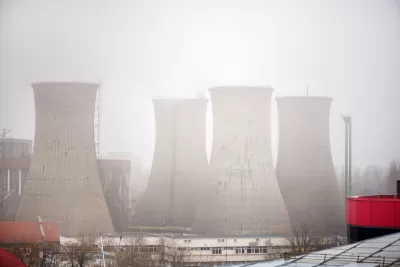Contentious policy revisions at the Environmental Protection Agency roll back data-guided policies under the Trump administration.

The U.S. Environmental Protection Agency (EPA) is moving forward with an agenda to rescind environmental regulations and annul a science-based approach to policy-making, reports Jeff Tollefson.
"In the past month alone, the agency has dialed down regulations on automobile emissions and fuel efficiency put in place under former president Barack Obama; it has weakened rules on mercury and other pollutants emitted by power plants; and it has shied away from strengthening standards to reduce fine-particle air pollution."
In March, President Trump completed a plan to reduce targets for automobile-emissions reductions from 5% per year to 1.5% per year. The EPA revised a method of cost-benefit analysis for regulation of power plant mercury emissions that no longer accounts for health benefits from a reduction in particulate matter. The agency also disregarded scientists' pleas to cut the maximum allowed average level of fine particulate matter, leaving it at the current standard.
A draft proposal of revisions to a "transparency" rule states that "if underlying data and models are not publicly available — which is often the case for private health-care data — the EPA could give them less weight or exclude them from consideration entirely when setting standards and conducting scientific assessments."
According to previous EPA official Betsy Southerland, these unprecedented policy changes amount to an attempted confutation of scientific fact.
FULL STORY: Five ways that Trump is undermining environmental protections under the cover of coronavirus

Maui's Vacation Rental Debate Turns Ugly
Verbal attacks, misinformation campaigns and fistfights plague a high-stakes debate to convert thousands of vacation rentals into long-term housing.

Planetizen Federal Action Tracker
A weekly monitor of how Trump’s orders and actions are impacting planners and planning in America.

In Urban Planning, AI Prompting Could be the New Design Thinking
Creativity has long been key to great urban design. What if we see AI as our new creative partner?

King County Supportive Housing Program Offers Hope for Unhoused Residents
The county is taking a ‘Housing First’ approach that prioritizes getting people into housing, then offering wraparound supportive services.

Researchers Use AI to Get Clearer Picture of US Housing
Analysts are using artificial intelligence to supercharge their research by allowing them to comb through data faster. Though these AI tools can be error prone, they save time and housing researchers are optimistic about the future.

Making Shared Micromobility More Inclusive
Cities and shared mobility system operators can do more to include people with disabilities in planning and operations, per a new report.
Urban Design for Planners 1: Software Tools
This six-course series explores essential urban design concepts using open source software and equips planners with the tools they need to participate fully in the urban design process.
Planning for Universal Design
Learn the tools for implementing Universal Design in planning regulations.
planning NEXT
Appalachian Highlands Housing Partners
Mpact (founded as Rail~Volution)
City of Camden Redevelopment Agency
City of Astoria
City of Portland
City of Laramie





























